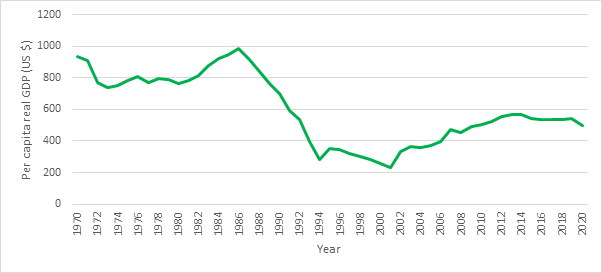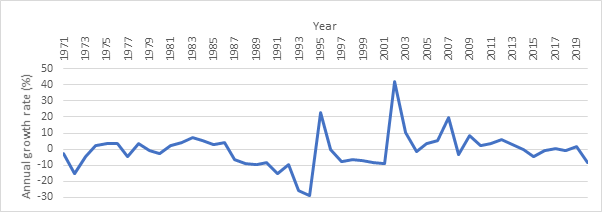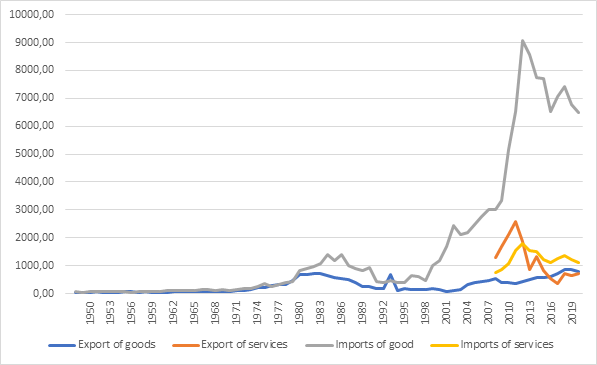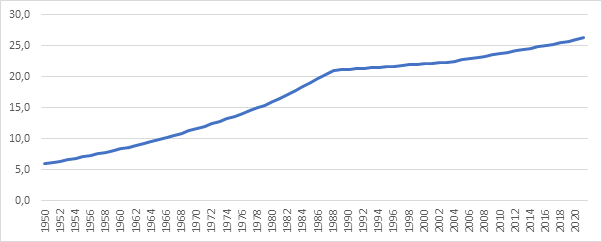Special Issue of Regional Science Policy & Practice on Sustainable Development of Afghanistan
Abdul Shaban, Professor, School of Development Studies, Tata Institute of Social Sciences, Mumbai, India (This email address is being protected from spambots. You need JavaScript enabled to view it.)
Rohina Zaffari, Assistant Professor, Department of Social Work, University of Kabul, Kabul, Afghanistan (This email address is being protected from spambots. You need JavaScript enabled to view it.)
Introduction
Regional Science Policy and Practice aims to publish scientific papers that examine people and places interaction with sound replicable methods and effective policies for regional sustainable development.
The regional sustainable development of Afghanistan matters to Afghanis and the World and therefore it is a very relevant object of study from Regional Science Policy and Practice perspective, for regional scientists in that region and around the world. Furthermore, this aspect becomes more relevant when most of the scientific work carried out on the country comes from political science, that focus spatial conflicts, and not from regional science that focuses on people and place interaction.
The Background
Human capital, democracy, peace, economic openness, and physical resources play determining role in the development of any country or region. Afghanistan is endowed with about US $ 3 trillion worth of mineral resources (Reuters 2021) and it is located in the crucial crossroad of China, India, Central Asia, and the Middle East. Nevertheless, the country has been caught in internecine warfare over the last several decades. As such it is a mineral resource-rich and central country, but poor economically. The country is known as the roundabout of Asia and had been on pathways of silk-route. Afghanistan as the country was born in 1880 as a consequence of the delineation of boundaries by the British and Russian empires. Historically, it has been a region of many kingdoms and a pathway of many civilizations. It has witnessed a multitude of religions and ideologies like Zoroastrianism, Vedic, etc, which are embedded into even today’s dominant conservative Islamic culture. The country is inhabited by more than 50 ethnic groups with their own cultures and traditions, crafts, and economic ways of life. Some of such major ethnicities are Pashtuns, Tajiks, Hazaras, Uzbeks, Turkmen, Aimak, Pashayi, Baloch, Pamiris, and Nuristanis. The country has a rich history of philosophy and literature of its own. Major Sufis of Islam, including Rumi, who gave the message of love and peace to the world, were born in the country. However, in the 19th and 20th Centuries it became a buffer zone between ideological battles of the West and Russia on the one side, and Islam and Mongols, Chinese and Indians on the other. The country became a battleground of conflicting ideologies. During the reign of Emir Abdur Rahman (1880-1901) the British and Russian officially defined the boundaries of what is today’s Afghanistan. With the third Anglo-Afghan war (1919), the British relinquished the control of foreign policy of Afghanistan on 19th August 1919, which is celebrated as Independence Day of Afghanistan.
King Amanullah Khan put emphasis on women's education, secularization, and modernization of Afghanistan. Given the development in Turkey under Ata Turk and a tour by King Amanullah to Turkey, Article 68 of Afghanistan’s First Constitution (adapted through Loya Jirga) made elementary education compulsory. Such progressive gender policies have been adopted much later by many countries. The government also banned hijab and opened many co-education institutions which angered the Islamic clerics leading to the Afghan civil war (1928-29).
King Mohammad Zahir Shah (1933-1973) continued the reform and liberalization and even introduced a bi-cameral system to promote democracy with both the shares of elected and selected representatives. This led to the growth of political parties and the People's Democratic Party of Afghanistan (PDPA) was one of them which allied with the USSR.
Mohammad Sardar Daoud Khan in 1973 captured the power from Zahir Shah due to economic and political instability and abolished the monarchy declaring Afghanistan as Republic with himself as its first president. He also abolished the Constitution of 1964.
In 1978, PDPA leaders in a bloody coup captured the power by overthrowing the Government. The country was renamed the Democratic Republic of Afghanistan (DRA), which lasted in different forms till 1992. As a communist government, they advocated the liberation of women. But because of factional fights and instability, the Soviet Union intervene militarily on December 27, 1979, in Afghanistan. In response to this, the USA, Saudi Arabia, and Pakistan started arming Mujahideen. Billions of dollars were spent on this. It is estimated that about 2 million Afghans got killed by the USSR forces till it withdrew in 1989. This also created the first Afghan refugee crisis as about 6 million people fled to neighboring countries and other developed countries.
The country then plunged into a civil war between different factions and powers during 1992-1996. The neighbouring countries had their vested interests in the instability of the country as they saw unstable Afghanistan and their influence important to influence other neighbouring countries.
In 1996, the Taliban occupied Kabul and a large part of Afghanistan. They implemented conservative Islamic policies and led to the compromise of women’s freedom and enormous hardship to already war-torn people. Some ethnic groups of the country became the target of the new regime. Arab fighters also partnered with the Taliban under the leadership of Osama bin Laden. They named Afghanistan as the Emirate of Afghanistan.
After the 9/11 incident, the USA and the British militaries attacked the Taliban Government. This led to the formation of the Karzai Government. These 20 years saw significant development whether it was related to infrastructure, education or people’s democratic freedom. However, the Taliban again has regained Kabul in 2021.
Current Developmental Situation
Notwithstanding its geopolitical significance and the rich mineral resources, the political and social instabilities have acted as barriers to the economic development of the country. The war over the years and conservative social practices have kept Afghanistan economically deprived. It is not surprising that today’s Afghanistan is one of the least developed countries of the world. As per the World Bank (2020), scarce data reveal that about 38% of the population of the country lived below the poverty line in 2010. Women and children are the major victims of the internecine wars. As per the UNCTAD (2020), the population of Afghanistan is about 39 million while the net migration in 2020 was -315 thousand (the World Bank 2020). The per capita income in current US $ was 461 (UNCTAD 2020).
Figure 1: Per capita real GDP (in US $ at 2015 prices) of Afghanistan

Source: Based on data from UNCTAD (2021).
Figure 2: Annual growth rate of per capita real gross domestic product (at constant 2015 US dollars) of Afghanistan.

Source: Based on data from UNCTAD (2021).
In fact, the real GDP growth of the country has been in negative during 2015-2020. Above this has been the rising inflationary pressure on the economy. The country experienced consumer price index growth of 5.6% during 2019-20. Total merchandise export was only of US $ 783 million in 2020 and the major partners in export have been UAE, India, Pakistan and China. In contrast to export, the import was estimated to be US $ 6.5 billion, leading to a current account deficit of more than -20.0% of the country’s GDP.
Figure 3: Trade in merchandised goods and services of Afghanistan

Source: Based on data from UNCTAD (2021).
There are hardly any major heavy industries in the country. The urban centres are economically weak and mainly serve as administrative or religious service towns. However, the carpet and creative economy of the country is well known around the world. This may be one of the potential sectors for economic development.
Figure 4: Urbanization population as percentage to total population of Afghanistan

Source: Based on data from UNCTAD (2021).
In 2019, the gross secondary enrolment rate was only 55%, while the mean year of schooling was only 4 years. The HDI value was 0.511 in 2019 and thus rank of the country was at the bottom, that is 169 out of 189 countries (UNDP 2020). There is a dismal presence of the banking system, and it is difficult for entrepreneurs to access formal credit.
Another major developmental concern is the situation of women. They have been placed over the years under increasing holds of patriarchy. Their educational, social, economic, and political lives are placed in disarray.
The proposed special Issue of RSPP
Given, the difficult political history and development situation, Afghanistan requires deeper analysis of its existing situation and human practices to learn and track itself on the path of sustainable development. The major challenge before the country is how to evolve a war economy into a peaceful and sustainable economy. The proposed special issue of Regional Science Policy & Practice will attempt to understand the possibilities of development of Afghanistan in the context the regional history and current reality, with the following major subareas (though not limited to),
- From war to peace, prospects for regional development in Afghanistan
- Regional philosophy of peace and development and spatial practices
- Economic structure and potentials of growth
- Inequality, poverty, and potential for sustainable community development
- The role of trade, especially the regional trade (India, Pakistan, China, Iran, and Central Asian Countries), and investment in development,
- Urban centers, regional growth (including rural-urban), and development
- Educational Institutions, skills, and human capital
- Women and development
- Sustainable Development Goals in the Regions of Afghanistan
Expression of interest (EoI) by prospective authors
We invite an abstract of 250-500 words from prospective authors highlighting the research problem, data, methods, major findings, and policy suggestions. The last date of submission of the abstract is 30 November 2021. Author(s) of papers will be communicated about the suitability of their abstracts, with suggestions if any.
The last date of submission of the final paper at the Journals website (as per the format recommended by the Journal for the process of peer review) is 31 March 2022.
For the paper submission to the journal and stylesheet, authors can consult the Journal site: https://rsaiconnect.onlinelibrary.wiley.com/journal/17577802
The abstract can be emailed to: This email address is being protected from spambots. You need JavaScript enabled to view it.
References
Reuters (2021). Factbox: What are Afghanistan's untapped minerals and resources? https://www.reuters.com/world/asia-pacific/what-are-afghanistans-untapped-minerals-resources-2021-08-19/
The World Bank (2020). Country Profile - Afghanistan. World Development Indicators database. https://databank.worldbank.org/views/reports/reportwidget.aspx?Report_Name=CountryProfile&Id=b450fd57&tbar=y&dd=y&inf=n&zm=n&country=AFG
UNDP (2020). Human Development Report 2020: The Next Frontier: Human Development and the Anthropocene. http://hdr.undp.org/sites/default/files/Country-Profiles/AFG.pdf
UNCTAD (2021). UNCTADSTAT. https://unctadstat.unctad.org/
